October is Eczema Awareness month
Eczema, also known as Atopic Dermatitis, is an inflammatory skin condition that causes itchiness, dry skin, rashes, scaly patches, blisters, and skin infections. While it can occur at any age, it is most common in young children. Eczema is chronic and can flare up from time to time. The condition is irritating but it’s not contagious. There are seven different types of eczema: atopic dermatitis, contact dermatitis, dyshidrotic eczema, nummular eczema, seborrheic dermatitis and stasis dermatitis. Your dermatologist can help in identifying the exact type you are experiencing.
Over 30 million Americans suffer from some form of Eczema. Symptoms can vary, some very mild to severe. The first symptoms of Eczema can show in children, adolescents, and adults. Babies can begin experiencing symptoms within the first few months after birth and sometimes as early as the first couple of weeks. Extremely dry patches of skin are usually the first sign in children. This itchy skin can lead to blisters and even skin infections if scratching is not controlled.
Causes of Eczema?
There are many factors and circumstances that can contribute to Eczema. This can include an interaction between your environment and your genes. An inflammation, or a flare-up, is produced when an irritant or an allergen from outside or inside the body triggers the immune system. This inflammation causes the symptoms common to most types of Eczema.
Creases of the skin can also lead to irritation. Areas behind the knees, elbows, lower legs, and other areas of skin that rub against each other are the most common.
There are many household items that are also potential environmental irritants that can cause Eczema flare-ups. These reactions may lead to an Eczemaflare.
Emotional stress can also cause an Eczema flare-up, but not known why.
Additional common triggers of Eczemamay include:
- some types of soap, body wash, facial cleansers, shampoo, bubble baths
- laundry detergents and fabric softeners with chemical additives
- wool or polyester in clothing, furnishings, and sheets
- extended exposure to dry air, extreme heat, or cold
- household cleaners and disinfectants
- candle fragrances
- jewelry or utensils with metals, especially nickel
- certain fabrics like wool or polyester in clothing and sheets
- isothiazolinone, an antibacterial found in personal care products like baby wipes
- formaldehyde, which is found in household disinfectants, some vaccines, glues, and adhesives
- cocamidopropyl betaine, used to thicken shampoos and lotions
- paraphenylene-diamine, used in leather dyes and temporary tattoos
Eczema Symptoms
- Dry skin
- Thick, cracked skin
- Scaly skin
- Raw, sensitive, swollen skin from scratching
- Itching
- Red to brownish-gray patches, especially on the hands, feet, ankles, wrists, neck, upper chest, eyelids, inside the bend of the elbows and knees, and in infants, the face and scalp
- Raised bumps, which may leak fluid and crust over when scratched
Eczema Treatment
- Itch control creams. We may prescribe a corticosteroid cream or ointment. Apply it as directed, after you moisturize. We will advise you of any side effects.
- Drugs to fight infection. Antibiotic creams may help if your skin has a bacterial infection, an open sore or cracks.
- Oral drugs that control inflammation. For more-severe cases, we may prescribe oral corticosteroids — such as prednisone.
Schedule an appointment with Alaska Family Dermatology and start a treatment plan.




